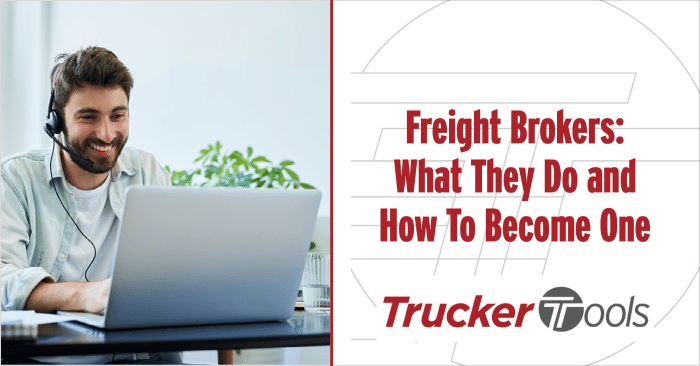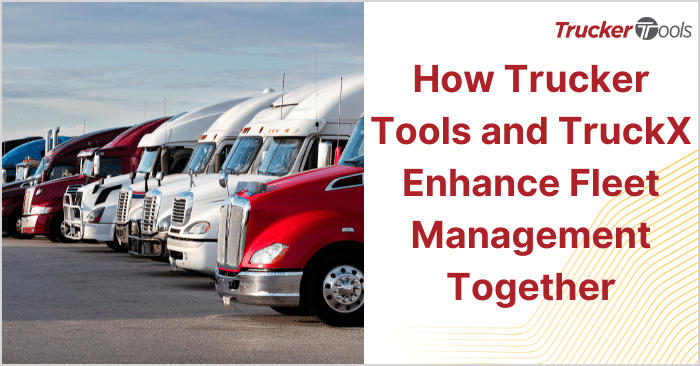If you’re curious about or new to the transportation industry, you’ve likely heard the term freight broker but may not know exactly what freight brokers do. Freight brokers play an essential role in the trucking and transportation industries. In the simplest terms, freight brokers connect owner operators and trucking companies with businesses that need to transport their goods by truck. You also may hear freight brokers referred to as intermediaries. While some businesses that need to ship goods conduct business directly with trucking companies, many use freight brokers to handle their truck transportation needs.
What Do Freight Brokers Do?
A successful, seasoned freight broker has two customers: the carrier or owner operator who transports a customer’s load and the customer (shipper). As a result, freight brokers must be excellent communicators who manage all aspects of the shipment. From making sure the shipper gets a good rate to monitoring the carrier’s compliance with national and state regulations, freight brokers are responsible for making sure all parties have what they need and that the shipment goes off without a hitch (so to speak!).
Find Truck Capacity
Freight brokers’ primary responsibility is finding trucks to transport their customers’ freight. Many freight brokers today use load boards to find truck capacity. A load board connects freight brokers and shippers who need trucks with carriers and owner operators who need freight for their trucks. Real-time load boards like Trucker Tools’ allow freight brokers to search for capacity in real-time at a desktop computer in a matter of seconds. Using real-time load boards saves freight brokers time and helps them find and secure truck capacity with the greatest efficiency.
Negotiate Rates on Behalf of Shippers
As part of securing truck capacity for their shippers, freight brokers must negotiate rates with carriers/owner operators who are interested in transporting their shippers’ freight. Many freight brokers negotiate rates by phone. This can get tricky when the carrier or owner operator is not answering their phone. Some freight brokers negotiate rates digitally using a software platform designed to help them find trucks. When using a software platform for capacity sourcing, you can quickly send a digital message about the rate to the carrier or owner operator via the platform instead of waiting on hold or for a call back. Capacity sourcing platforms like Trucker Tools’ include tools that automate rate negotiations and save valuable time.
Track Freight When in Transit
Another major duty for freight brokers is tracking the progress of the shipment once the driver picks up the load from the shipper. Most freight brokers now use a digital load tracking technology to track loads for their shippers. Load tracking technology typically is comprised of a mobile app that the driver downloads to their smart phone and a load tracking interface through which the broker can view the real-time progress of the shipment. Load tracking tech is valuable because it allows freight brokers to monitor their shippers’ freight in real-time and provide accurate ETAs to their shippers. It also allows brokers to address delays as they occur in real-time, driving better customer service.
Maintain Long-Term Relationships With Carriers, Owner Operators
Building and maintaining relationships with trucking companies is arguably the most important part of a freight broker’s job. When freight brokers have ongoing, positive relationships with carriers and drivers, they can cover their shippers’ loads quickly. If a load needs special handling or you find yourself in a pinch, you can call on those carriers with whom you have long-term relationships to help you out. One of the best ways to build repeat business with top-performing carriers is to be easy to do business with. Making it easy for carriers to do business with your brokerage increases the likelihood that they’ll want to move your freight again and again.
How To Become a Freight Broker
If you’re interested in becoming a freight broker, know that there are a few basic steps involved. While the process is relatively simple, it may take some time to complete the necessary requirements, so keep this in mind as you set up your freight broker business.
Get Training
Though no formal education is required by law for freight brokers, you do need to have a good knowledge of the industry in order to be successful freight broker. If you’re brand new to the industry, it’s a good idea to take classes online or in person to learn the basics of freight brokerage. These classes may be offered through local community colleges, universities, adult ed programs and/or through schools that specialize in training freight brokers. Some freight brokerages also offer on the job training to new freight brokers, which is a great way to build your expertise.
Apply for Freight Broker Authority
Once you have received adequate training, you may be ready to spread your wings and open your own freight broker business. To do so, you’ll need to apply for operating authority with the Federal Motor Carrier Safety Administration (FMCSA). You’ll apply via the FMCSA’s Unified Registration System. Your application will take four to six weeks to process and the current application fee is $300. As part of your application, you’ll need to provide proof of insurance in the form of a surety bond or trust fund agreement in the amount of $75,000. You’ll also need to complete Form BOC-3, Designation of Process Agent Form, in each state where you maintain an office.
Discover “How To Find Freight Carriers.”






